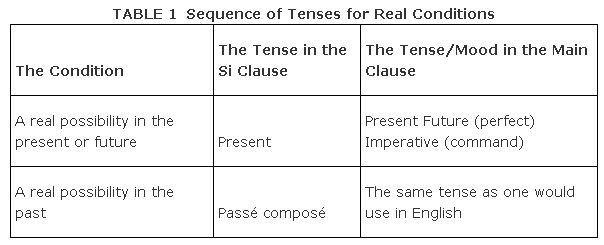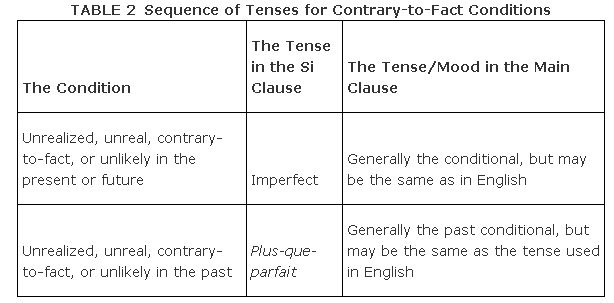A conditional sentence is made up of a si clause (also known as a condition clause) and a result, or main, clause. Only four tenses of the indicative mood (the mood that states a fact) may normally be used in French in the si clause: the present, the passé composé, the imperfect, and the plus‐que‐parfait. The tense used in the main clause is the same in both French and English. In a conditional sentence, si generally means “if.”
Real conditions
A condition that describes what is possible or likely in the present or past is called a “real” condition:
- Si tu me téléphones, je te parlerai. (If you call me, I will speak to you.)
The sequence of tenses for a real condition is shown in Table 1.

In the examples below, note that either clause may begin the sentence, but in the si clause, the subject must be followed by the present or the passé composé. Note that si elides with il or ils to become s'il and s'ils, respectively, but does not elide with elle (si elle) or elles (si elles). Si followed by the present:
- Si j'ai soif, je bois de l'eau. (If I'm thirsty, I drink water.)
- Tu réussiras, si tu étudies beaucoup. (You will succeed, if you study a lot.)
- S'il ne commence pas immédiatement, il n'aura pas fini avant midi. (If he doesn't start immediately, he will not have finished before noon.)
- Si je suis en retard, attends‐moi. (If I'm late, wait for me.)
Si followed by the passé composé:
- Le vol n'est pas encore arrivé, si j'ai bien entendu. (The flight hasn't arrived yet, if I heard correctly.)
- Si j'ai bien compris, elle a changé d'avis. (If I understood correctly, she changed her mind.)
- S'il s'est trompé, il perdra beaucoup d'argent. (If he made a mistake, he will lose a lot of money.)
- Elle ne savait pas les détails, si elle vous a dit cela. (She didn't know the details, if she told you that.)
- Si tu l'as appris, n'en dis rien. (If you heard about it, don't say anything.)
Contrary-to-fact conditions
A conditional sentence that describes a situation or event that is unlikely is called “contrary‐to‐fact” or “unreal”:
You might say the following if you're not expecting snow:
- S'il neigeait, je ne sortirais pas. (If it snowed, I wouldn't go out.)
The sequence of tenses for a contrary‐to‐fact condition is shown in Table 2.

Once again, either clause may begin the sentence, but in the si clause, the subject must be followed by the imperfect or the plus‐que‐parfait.
Si followed by the imperfect:
- Si j'étais riche, je m'achèterais un château. (If I were rich, I'd buy myself a castle.)
- Je t'enverrais de l'argent, si tu en avais besoin. (I would send you money, if you needed some.)
- S'il avait eu le temps, il t'aurait aidé. (If he had had the time, he would have helped you.)
- J'aurais fait un gâteau, si j'avais su que tu venais. (I would have baked a cake, if I had known you were coming.)
In conditional sentences, si always means “if.” When si means “whether,” it may be followed by any tense, just as in English:
- Savez‐vous si elle travaillera demain? (Do you know if she will work tomorrow?)
- Je ne savais pas s'il le ferait. (I didn't know whether he would do it.)